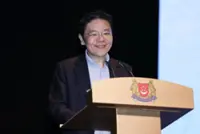BEIJING: Singapore and China can work together to ensure financial stability, manage risks to prevent future crises, and bolster the role of finance in catalysing development, said Deputy Prime Minister Heng Swee Keat.
Ongoing bilateral projects, from the Suzhou Industrial Park to the Guangzhou Knowledge City, have provided a strong foundation to deepen cooperation in trade and investment, he told China’s Vice-Premier He Lifeng in a Beijing meeting on April 10.
DPM Heng is on a six-day official visit that started on April 7 – his first to China since October 2019 – to explore ways to strengthen bilateral cooperation.
This was his first time meeting He, who oversees China’s economic and financial policies.
In their meeting, DPM Heng said his experience in handling two major financial crises in the past taught him about the impact on the economy “when the financial system and the real economy become decoupled”.
He was managing director of the Monetary Authority of Singapore (MAS) during the global financial crisis around 2008, and principal private secretary to founding prime minister Lee Kuan Yew during the Asian financial crisis of 1997.
Heng added that in his previous roles, he got to know well Chinese officials such as former central bank governor Zhou Xiaochuan and Mr Guo Shuqing, former head of the China Securities Regulatory Commission.
DPM Heng also co-chaired the Joint Council for Bilateral Cooperation with China’s then Vice-Premier Han Zheng between 2019 and 2022. The annual top-level meeting between the two countries coordinates flagship inter-government projects like the Suzhou Industrial Park.
“So, we have a very strong foundation to continue to deepen our relationship in trade and investment, and also contribute to regional and global developments,” said DPM Heng.
“And also how to work together to ensure financial stability, and the role of finance in catalysing real development and risk management to prevent crises.”
He, who spoke earlier, said he looked forward to hearing DPM Heng’s perspectives on the next steps for the China-Singapore relationship, as well as trade and macroeconomic policy cooperation.
The Vice-Premier is familiar with Singapore, having chaired the Sino-Singapore Tianjin Eco-City Investment and Development Co, the master developer of the Tianjin Eco-City.
He said: “Our relationship has its distinctive features because we have specific projects, and realising them has contributed to economic and trade ties, as well as people-to-people interactions, bringing them to a new level.
“This is a very meaningful development, which also speaks to the progress that China has achieved throughout the course of reform and opening up.”
Singapore’s Ministry of Foreign Affairs said DPM Heng and He discussed ways to strengthen bilateral economic ties, as well as the importance of enhancing financial connectivity and increasing cross-border financial flows between the two countries.
They also exchanged views on regional and international economic and financial developments, added the ministry.
The meeting took place at the Central Financial and Economic Affairs Commission’s office, which He heads. Other officials who attended included China’s central bank governor Pan Gongsheng, China Securities Regulatory Commission chairman Wu Qing, as well as officials from Singapore’s National Research Foundation and MAS.
Earlier on April 10, DPM Heng met China’s Minister for Science and Technology Yin Hejun for the first time. Yin was appointed in October 2023 and is also the ministry’s party secretary.
He told Yin that China offered an important development model for many developing countries in balancing economic growth with raising living standards and protecting the environment. Issues such as pandemics, climate change and resource utilisation are critical not just for Singapore and China but also for the world, DPM Heng said during the meeting at the ministry.
“China offers a very important model of development for many developing countries, because if you can do it well – in growing the economy but also taking care of the people and planet – you can offer a model that uses resources much more efficiently,” he said.
In his remarks, Yin said DPM Heng was an “old friend” of his ministry, with bilateral cooperation in science, technology and innovation reaching a new level under his support. He noted that DPM Heng visited the ministry in October 2018 and met his predecessor, Wang Zhigang.
DPM Heng met Wang again in Singapore in December 2019, when they witnessed the signing of a five-year agreement on cooperation in science, technology and innovation.
“I look forward to establishing a good personal friendship and working relationship with you through today’s exchanges, to promote new progress in the cooperation between our two countries in science, technology and innovation,” said Yin.
Earlier in his trip, Heng met Han Zheng, now China’s vice-president, during which they reaffirmed bilateral relations. Heng also visited an artificial intelligence research institute at Tsinghua University, and will head to Shenzhen and Hong Kong after Beijing. - The Straits Times/ANN





